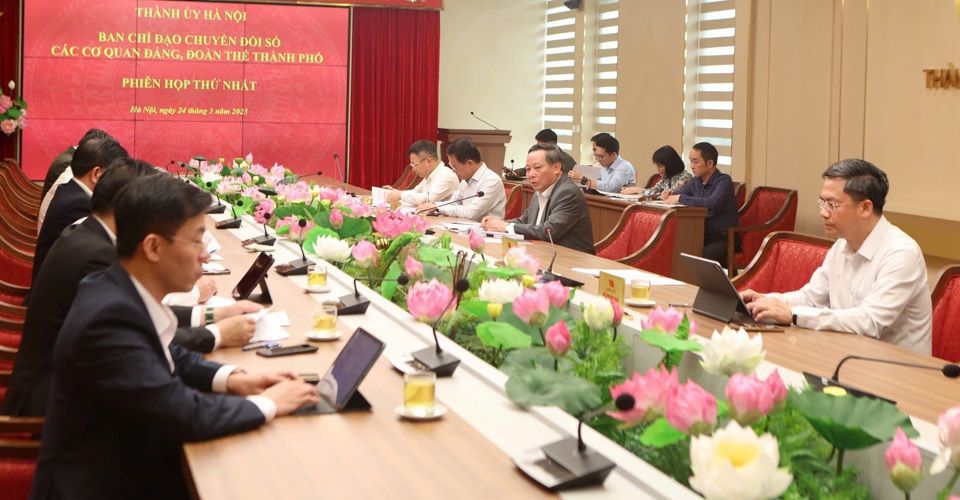Hanoi drives digital transformation across political system
Hanoi is strongly modernizing its political system by promoting digital transformation at all levels.
THE HANOI TIMES — Hanoi's goal for a "paperless conference room" in several government agencies signals a major shift toward a fully digital workspace.
This utility will be fully implemented by the third quarter of 2025, along with the complete digitization of documents at the city, district, and commune levels.
At the same time, Hanoi is developing a shared digital storage system and integrating public services into the National Public Service Portal to build a transparent, efficient, and modern administration.
Efforts to accelerate digital transformation
Recognizing digital transformation as a key political mission, Hanoi leads nationwide efforts to modernize the political system. It takes a comprehensive approach that synchronizes infrastructure, institutional reforms, and human resource development to enhance leadership, governance efficiency, and public services.

The first meeting of the Steering Committee for Digital Transformation in Party and mass organizations of Hanoi. Photo: kinhtedothi.vn
Standing Deputy Secretary of the Hanoi Party Committee Nguyen Van Phong stated that Hanoi is the first locality in Vietnam to merge three steering committees: Administrative Reform, Digital Transformation, and Project 06.
Launched by the Ministry of Public Security, Project 06 uses population data and digital IDs to streamline administrative procedures and improve public services, supporting Vietnam's digital transformation.
The city adheres to the motto "5 clear, 1 consistent" - clear tasks, clear responsibilities, clear processes, clear results, clear resources, and one consistent leadership - to ensure unified direction and effective implementation.
Hanoi has established more than 5,034 community digital teams with 30,000 members to connect the government and citizens. The city has also delegated 597 administrative tasks to lower levels to improve efficiency and service.
In early 2025, Hanoi issued an action plan to implement the digital transformation project for Party and mass organizations under Decision No. 204 QD/TW. At the same time, the People's Committee instructed all levels to apply integrated IT systems to ensure consistency from the city to the grassroots.
A key achievement is Hanoi's three-tiered networked electronic system. It includes tools such as document management software, official e-mail, paperless meeting rooms, task tracking, virtual assistants, secure digital signatures, and platforms for managing officials, civil servants, and party members.
The city introduced platforms such as the "Electronic Party Member Handbook" and "iHanoi" to support real-time interaction between party members, government agencies, and citizens. By March 2025, iHanoi had reached over five million users, becoming a key tool for smart city governance.
Hanoi places an emphasis on training officials and civil servants, especially at the grassroots level. Training programs focus on digital workflows, IT applications, data security, and the use of shared software, helping to build a capable digital workforce.
In terms of institutional reforms, Hanoi established digital transformation departments in Party and government agencies and guided the digitization of records.
It has also introduced data sharing regulations to ensure security, efficiency, and interconnectivity.
Additionally, Hanoi is accelerating the integration of online services into the national public service portal, including party fee collection, construction permits, and notarization. The city aims to fully digitize all internal and public procedures by the end of 2025.
Technology expert Nguyen Minh Quang praised Hanoi's comprehensive approach, noting: "The city is investing in infrastructure, policies, and people. Digital transformation helps streamline administration and support real-time, two-way engagement between the Party, government, and citizens."
In a 2024 survey on digital transformation in Tay Ho District, Ha Minh Hai - Head of the Organization Commission of the Hanoi Party Committee and former Deputy Head of the Steering Committee for Administrative Reform, Digital Transformation, and the Implementation of Project 06 - emphasized the importance of putting citizens at the center in the digital transformation process, which requires state management agencies to continuously improve the quality of public services.
He said the implementation of digital transformation tasks must adhere to three core principles, including the rule of law, active listening, and a dedicated service attitude. At the same time, agencies should strive to achieve six strategic goals: comprehensive awareness, long-term vision, creative thinking, smart solutions, decisive action, and practical results.
Vu Ngoc Thiem, Head of the Government Cipher Committee, said Hanoi is the first place in the country to implement a synchronized system of eight digital transformation applications across all three levels of the Party.
"This is a breakthrough in leadership and governance in line with the national vision for digital development."
Spreading digital government models
Beyond implementation, Hanoi is actively sharing its digital transformation experience with other localities. At a recent working session with the southern province of Ca Mau, Hanoi's leaders introduced their three-tier software system and shared their expertise in training digital personnel, building shared platforms, and establishing data coordination mechanisms.
Nguyen Duc Hien, Deputy Secretary of the Ca Mau Party Committee, expressed admiration for Hanoi's methodical and scientific approach. He noted that Ca Mau still faces challenges in infrastructure and workforce development, and hopes to adapt Hanoi's model to its local context.
By leading by example and fostering collaboration, Hanoi is making a significant contribution to scaling digital government models nationwide and advancing Vietnam's comprehensive digital transformation.












